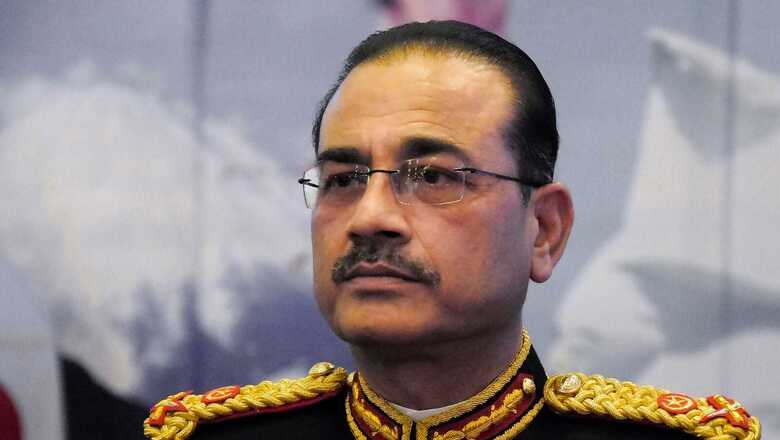
views
So the thing is done. And surprisingly for Pakistan, entirely by democratic norms, at least on the surface. Prime Minister Shahbaz Sharif, however, had little flexibility in selecting a new army chief. His brother Nawaz, who runs the whole show, would have advised him to go by the book in selecting the new army chief. And that’s what he did. Lt Gen Asim Munir, is the new Chief, and he is the senior most. But nothing in Pakistan is ever simple, particularly when it comes to the army’s handling of the civilians, or vice versa. It’s not at all simple for the new chief either. Bajwa’s legacy is anything but mild.
THE CHAOS DURING SELECTION
First, the selection itself. According to Article 243(3) of the Constitution, the president appoints the services chiefs on the recommendation of the prime minister. Then there’s the Rules of Business which also include the consultation clause. As in most countries, a list of those who are senior most are sent to the Defence Ministry, which then is supposed to forward this to the PMO. But the role of the Ministry came to the fore when the Defence Minister announced in a tweet that no summary had been sent to the PMO, even as the DG, Interservices Public Relations (ISPR) announced that it had done so. Matters were made worse as Information Minister Marriyum Aurangzeb said that the statement ‘attributed’ to Defence Minister Khawaja Muhammad Asif regarding a summary for appointing a new army chief was false.
Finally, it was a period of tension while the President was ‘consulted’. Even as the Information Minister announced that Lt Gen Asim Munir had been named chief of army staff and Lt Gen Sahir Shamshad Mirza as the chairman of the Joint Chiefs of Staff Committee, the President was off to meet Imran Khan (apparently) recuperating from the assassination attempt. On the sidelines, the Defence Minister was still warning that it was a ‘test’ for the President whether he would follow constitutional norms. In the end, he did, but not before Imran Khan made it abundantly clear that he had a voice not only in the selection, but the ‘constitutional’ process.
That’s important, as he – and his several thousands of supporters – see him as coming back to power.
THE GENERALS TAKE A BOW
Lt-Gen Asim Munir’s promotion makes it possible for him to continue for at least another four years, as now allowed under the new legislation, ironically made by the Imran Khan government. That gives him a comfortable tenure. Both are Bajwa loyalists, and the Dawn provides details about each.
The most touted aspect of Lt Gen Munir is that he was the shortest serving ISI Chief, being pushed out by Khan, who seems to have favoured Lt Gen Faiz Hameed. Analysts say that this change was due to Gen Munir’s demand that Khan’s wife’s financial assets be declared. The good Pirni was finally registered as a tax payer only in March 1, 2022, but seems to have had a lot put by, and made even more while her husband lorded over the PMO. Whether this version of events is true is unclear, as it seems unlikely that the COAS would tamely agree to change his ISI chief on the whims of a political head.
Whatever the reason, Munir was shunted out in eight months, to command the Gujranwala Corps, a position he held for two years, before being moved to the GHQ as Quartermaster General. That’s not exactly big stuff, of the kind Lt Gen Faiz Hameed can boast of. But he was part of the delegation which not only held talks with the Chinese last year, but was also part of the Quadrilateral Coordination Group (QCG), involving Pakistan, China, Afghanistan and the United States. In other words, he knows his China.
THE TIME IS RATHER MORE THAN RIPE
Both step into a Pakistan that may seem changed out of recognition. Not the political noise and protests, which is par for the course here, but the attitude to the army, and probably the army itself. The hate against the Army Chief primarily, and less so the khakis was apparent in the shouts of ‘kutta’ against the army chief, while Khan himself not just targeted Bajwa, but tried to sow dissension against him within the army. That he may have succeeded was indicated in a rarest of rare presser where ISI Chief Lt Gen Nadeem Anjum gave a spirited defence of the Chief.
But the trouble is that no one believes them anymore. That loss of faith in the army could only have gotten worse after the ‘leaks’ of the General’s declared income, which includes half a million dollars that his wife has in the US Banks and immense wealth to this immediate family, including plots in the elite Defence Housing Colony ‘granted’ to a new daughter-in-law. That’s staggering, and makes allegations of Khan’s Rs 142 million in Toshakhana gifts seem pale by comparison. These are declared assets.
What the General holds in undeclared riches is anyone’s guess. In short, the absolute trust and faith in the army is a thing of the past. At a time of severe economic stress and political bickering, the people’s anger has fallen – rightly or wrongly – on the army. That means the new establishment could already have one hand tied behind its back.
THAT POISONOUS LEGACY CONTINUES
Not that it recognises this. The fact that one of its first acts was the re-arrest of PTI Senator Azam Swati for insulting the army on Twitter seems to indicate that the Bajwa ‘show’ will go on. How that show evolved is worth paraphrasing.
General Bajwa himself inherited a none too great legacy, after a vilifying social media campaign was launched against him, just before he was to take over as the Chief, at a time when the outgoing chief Gen. Raheel Sharif was hoping for an extension. That extension could hardly have been desired to ‘serve’ his people. Clearly the rewards were magnificent. Then came a series of incidents that served to show just how far the army would go to keep its power – the extreme right wing clearly establishment backed the Tehreek-e-Labbaik protests against Nawaz Sharif, the later full use of the ‘Panama leaks’ to publicly name and shame the whole Sharif and Bhutto family, none of which were finally proven, and the blatant backing of Khan.
The latter responded with this constant declarations that both were “on the same page” on every issue. Under Bajwa in particular, the so-called ‘hybrid’ model was virtually out of the window, as the army took over almost every task of the government, heading even the prestigious China Pakistan Economic Corridor. In simple words, the army, till it fell out with Khan, was not just on the same page, but had bought the entire book.
The new army chief will therefore have to deal with a far more politicised and corrupt army – indeed the one arises from the other — that could mean serious rot within. Remember, an attempted coup was planned as recently as 2014.
It could happen again, if one group within the army decides to support Khan.
NO OPTION TO WITHDRAW
The most delicious irony is that having brought matters to this pass, there is little chance that the new chief could suddenly decide to hold himself aloof from the political chaos, and restore the army’s badly tattered dignity. But it’s the very chaos, both political and economic, that will force him to intervene and hold the tiller steady (or unsteady, depending on your point of view), since a squabbling coalition clearly seems unable to do so.
International agencies have warned of a currency crisis in Pakistan, as the rupee slid to below PKR 233 to the dollar. Debt and liabilities stood at Rs 62.46 trillion, about Rs 10 trillion more than the last fiscal year. Many countries have a high debt. The problem is the ability to repay it. This could inevitably put pressure on the defence budget.
Remember, it was the army chief who stepped in to negotiate an immediate $1.2 bn from the IMF to stave off a crisis, and a crucial visit to the US just before delisting by the Financial Action Task Force; it was also the army which has been critical in trying to negotiate better terms with the Chinese. No, the chief can’t step back. His choice is how much to step forward in ensuring that Khan doesn’t make it to the elections.
FOR INDIA, IT’S ABOUT THE FACTS ON THE GROUND
For India, the fundamental rule of distrusting Pakistan can hardly change. Remember the ‘Bajwa doctrine’ in 2018 espoused peace with all neighbours, assuring Afghanistan that its sovereignty would be respected. That persuaded President Ghani to protest only marginally when Islamabad created a high-tech triple wire fence that guarded its weakest areas. Once nearly completed, Pakistan launched the Taliban. So much for Pakistani ‘good intentions’.
True, that fence is now under serious attack by an irritated Taliban. To the west, Pakistan’s border with India remains largely peaceful due to the continued ceasefire, but that could change too. What is not going to change anytime soon is that Pakistan cannot afford a war, even if it receives assistance from friends like Turkey and China. This ‘external balancing’ can only work up to a point. Finally a country has to budget and create its own defences.
It is likely that in this state of affairs, the army could work up an ‘India threat’ to shore up its rock bottom reputation. Statements from Indian army senior officers on retaking Pakistan Occupied Kashmir will help greatly in such efforts. Delhi could ideally leave Pakistan to its own devices and squabbling. But this time around, Pakistan is dangerously unstable, with repercussions for the rest of the region. India must consider reaching out to the new chief, accepting – as everyone else does – that he will remain the engagement point for the foreseeable future, and suggest that a Pakistan that becomes a South Asian highway for trade and investment is the only way out for its own survival.
It is also worth stressing that Delhi has other options, and can choose to ignore Islamabad entirely, as other forums beckon. Pakistan’s only other option is to become a Chinese colony. Really, it doesn’t need much heavy thinking.
The author is a Distinguished Fellow at the Institute of Peace and Conflict Studies, New Delhi. She tweets @kartha_tara. The views expressed in this article are those of the author and do not represent the stand of this publication.
Read all the Latest Opinions here


















Comments
0 comment